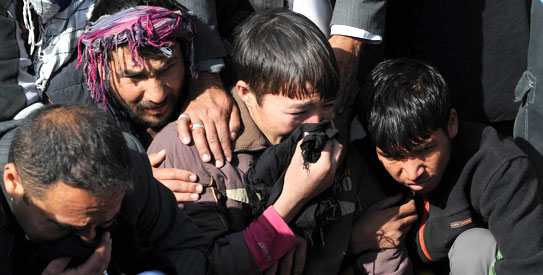
ISLAMABAD: Lashkar-e-Jhangvi, the terror group blamed for deadly attacks on Shias in Afghanistan this week, has forged ties to Al-Qaeda and the Taliban in a murderous campaign to wage sectarian warfare.
Since its inception in 1996 by a religious extremist, the faction has claimed to have killed thousands of Shias in bombings and shootings across Pakistan.
It takes its name from Maulana Haq Nawaz Jhangvi, the founder of terror group Sipah-e-Sahaba from which leader Riaz Basra broke, and preaches indiscriminate violence against Shias.
A suicide attack tore through a crowd of worshippers in Kabul on Tuesday as they marked the holy day of Ashura, killing 55 people, as a second blast in the northern city of Mazar-i-Sharif left four more dead.
There has been no confirmation of a purported claim from Lashkar-e-Jhangvi (LeJ) splinter al-Alami, but Kabul blamed the group for Tuesday’s massacre, unprecedented in targeting such an important religious holiday in Afghanistan.
LeJ is not thought to have struck in Afghanistan before.
“We will pursue this issue with Pakistan and its government very seriously,” said Afghan President Hamid Karzai, threatening to ratchet up tensions with Islamabad which are already frayed over accusations of sponsoring violence.
Afghan officials say the motive was to inflame a 10-year Taliban insurgency and drastically increase violence by importing Pakistan and Iraq-style sectarian conflict as Nato combat troops prepare to leave by the end of 2014.
A substantial rise in sectarian unrest could also draw arch US foe Iran deeper into Afghanistan, threatening to whip up proxy wars.
The Taliban denied involvement, but in a cauldron of violence where religious terror groups are interlinked and have overlapping allegiances, experts say it would have been impossible for the LIJ killers to have acted alone.
As with Al-Qaeda, the Taliban and other terror groups the world over, LeJ was born from the ashes of the 1980s Afghan war against the Soviet Union.
The group’s leaders were veterans of that conflict and its ranks populated by graduates of madrassas packed off to terror training camps in the mountains on the Afghan-Pakistani border.
It developed close ties to Al-Qaeda and the Taliban, which ruled in Kabul from 1996 until the 2001 US-led invasion.
Pakistan formally banned the group in 2001 and there have been numerous crackdowns with arrests and killings of known Jhangvi operatives over the last 20 years.
Islamabad has asked Afghanistan to provide proof that Jhangvi militants were responsible for Tuesday’s attack, but it is understood that Afghan officials do not have any hard evidence.
One official said the bomber was a Pakistani from Kurram, part of Pakistan’s tribal region with Afghanistan, and a specific flashpoint for sectarian unrest.
But as long as doubts persist over the al-Alami claim, it remains unclear how exactly the group could have carried out the attack.
“The question is, how credible is the claim? Some Taliban groups can do the same as they share school of thought with LeJ,” said Pakistani-based security analyst Hasan Askari.
Militancy expert Rahimullah Yusufzai also doubted the claim, saying that the splinter group’s capacity is very limited even in Pakistan, which has seen a recent decline in attacks linked to its own bloody Taliban insurgency.
“There is one possibility that this group may have support of Al-Qaeda, Tehreek-e-Taliban Pakistan or some of the rogue elements inside Afghanistan,” Yusufzai.
Jhangvi’s founder Basra has been dead for a number of years. Reports differ on whether he was killed in an explosion or a shootout with security forces.
A senior Pakistani security official said LeJ and other extremist groups are “hand in glove with the Taliban”.
“But they cannot carry out such an attack on their own. This would have surely been a Taliban-connected operation,” he told AFP.
“Al-Alami are basically the Punjabi Taliban, who were involved in the attack on (army) GHQ (general headquarters) two years ago,” he added.











































